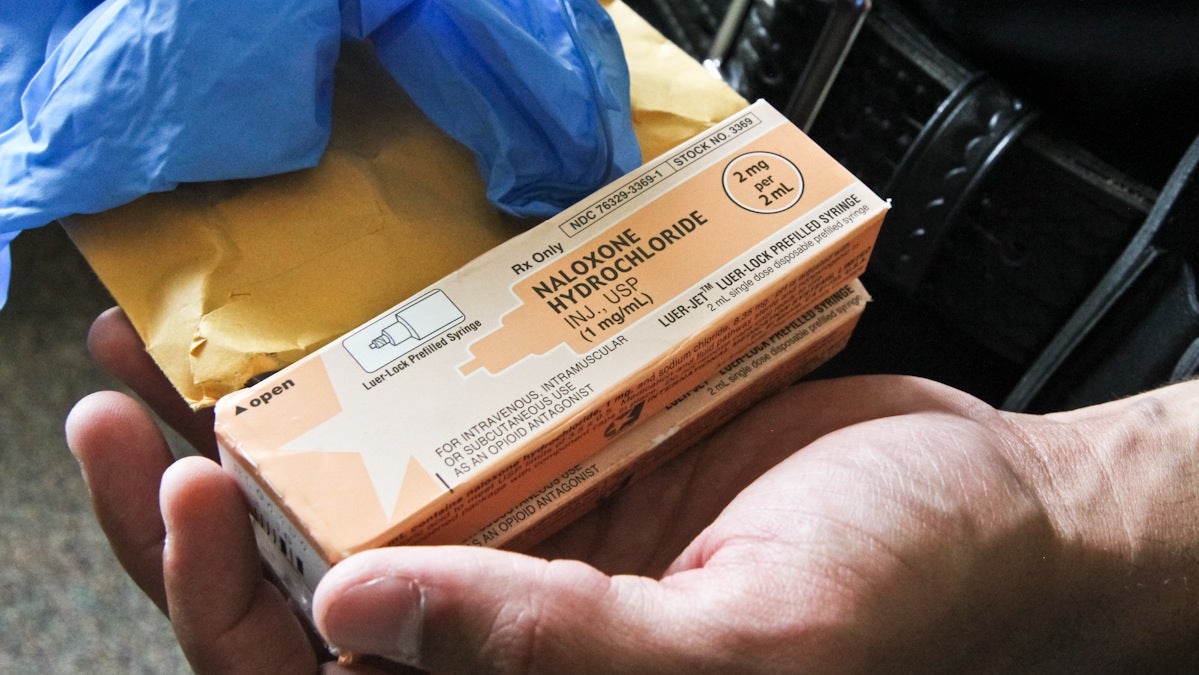Pennsylvania expands community access to ‘overdose antidote’ this weekend

A police officer displays the drug Narcan. (Kimberly Paynter/WHYY)
Beginning Saturday, police and community members will have greater access to Nalaxone in Pennsylvania. If administered soon enough, the drug can immediately reverse the effects of a life-threatening overdose of heroin or another opioid such as OxyContin.
The General Assembly and Gov. Tom Corbett approved “David’s Law” earlier this year in response to the rising number of fatal overdoses in Pennsylvania. It’s named after David John Massi II of Upper Chichester, who died last year at 27 from a heroin overdose.
Among other things, the law allows doctors to directly prescribe the drug to those who have close ties to someone at risk of an overdose.
Philadelphia advocate Carol Rostucher, co-founder of United we C.A.N. (Change Addiction Now), says a lot of families can benefit, including hers.
“For families, it’s another chance at their loved one to attempt recovery,” she said.
She worries about her 25-year-old son who’s struggling with addiction.
“God forbid he were to OD in my presence, I could just take the nalaxone — the needle or the nasal spray — and it would bring him back to life,” she said, instead of waiting for help to arrive. “With all those minutes passing, that’s how you lose lives.”
How does nalaxone work? Click here for more on the science of the drug.
Beyond nalaxone: Click here for more on how to prevent fatal overdoses.
Brought back to life by nalaxone: Click here for more on one local man’s story of a near-fatal overdose
Prevention Point in Philadelphia and in Pittsburgh already run small nalaxone training and distribution programs, but Rostucher says that leaves out huge swaths of the state where overdoses are on the rise.
The new rule also includes a “911 Good Samaritan” clause, giving limited legal immunity for certain drug crimes to anyone who calls to report an overdose.
Gary Tennis, director of the state’s Department of Drug and Alcohol programs, said he has no doubt that lives will be saved, especially given that police and firefighters, often first to the scene, will now be authorized to administer the drug.
“These kinds of changes are going to make a big, big difference,” Tennis said. “In Quincy, Massachusetts, where the police got it, a city of 100,000, they reduced 169 overdoses in the first three years of their program.”
Last week, officials in Delaware County announced that its entire police force would be equipped with the nasal form of the drug, starting Saturday.
Because of regional variations in overdose reporting and medical examiner protocols, Tennis thinks the number of overdoses is higher than one would think. He estimates about nine Pennsylvanians die each day of some kind of drug-related overdose.
At least a dozen other states have similar laws, including Delaware and New Jersey.
WHYY is your source for fact-based, in-depth journalism and information. As a nonprofit organization, we rely on financial support from readers like you. Please give today.

